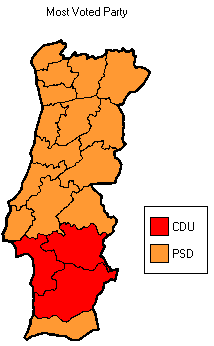| |||||||||||||||||||||||||||||||||||||||||||||||||||||||||||||||||||||||||||||||||||||||||||||
All 250 seats in the Assembly of the Republic 126 seats needed for a majority | |||||||||||||||||||||||||||||||||||||||||||||||||||||||||||||||||||||||||||||||||||||||||||||
|---|---|---|---|---|---|---|---|---|---|---|---|---|---|---|---|---|---|---|---|---|---|---|---|---|---|---|---|---|---|---|---|---|---|---|---|---|---|---|---|---|---|---|---|---|---|---|---|---|---|---|---|---|---|---|---|---|---|---|---|---|---|---|---|---|---|---|---|---|---|---|---|---|---|---|---|---|---|---|---|---|---|---|---|---|---|---|---|---|---|---|---|---|---|
| Registered | 7,930,668 | ||||||||||||||||||||||||||||||||||||||||||||||||||||||||||||||||||||||||||||||||||||||||||||
| Turnout | 5,676,358 (71.6%) | ||||||||||||||||||||||||||||||||||||||||||||||||||||||||||||||||||||||||||||||||||||||||||||
| |||||||||||||||||||||||||||||||||||||||||||||||||||||||||||||||||||||||||||||||||||||||||||||
| |||||||||||||||||||||||||||||||||||||||||||||||||||||||||||||||||||||||||||||||||||||||||||||
The 1987 Portuguese legislative election took place on 19 July. The election renewed all 250 members of the Assembly of the Republic.
Contents
- Background
- Fall of the government
- Leadership changes and challenges
- Electoral system
- Parties
- Seat changes
- Campaign period
- Party slogans
- Candidates' debates
- Opinion polling
- Results
- National summary
- Distribution by constituency
- Maps
- See also
- Further reading
- Notes
- References
- External links
In the previous election, in 1985, the Social Democratic Party had won a minority government managing to survive in coalition with the Democratic and Social Center and the Democratic Renewal Party, and after the approval of a no-confidence motion from the left-wing parties, with the aid of the Democratic Renewal Party, the government fell. The PS tried to form a new government with the support of the PRD and CDU, but Mário Soares, the President at the time, rejected the idea and called for a new election. [1]
The PSD was reelected in a landslide, winning a majority government with just over 50 percent of the votes and 148 of the 250 seats, a majority of 46. Not only was this the most seats that a Portuguese party had ever won in a free election, but it was first time since the Carnation Revolution that a single party won an absolute majority. Although the PSD was very popular going into the election, the size of its victory far exceeded the party's most optimistic expectations. The PSD won every district with the exception of Setúbal, Évora and Beja, which voted for the CDU.
The Socialist Party gained a few seats and got a slightly higher share of the vote, 22 percent compared with the almost 21 percent in 1985, but the scale of the PSD victory made the party lose most of its influence. Like in 1979, 1980 and 1985, the PS failed to win a single district. The left-wing Democratic Unity Coalition lost some of its MPs to the Socialist Party and the Democratic Renewal Party, now led by former President António Ramalho Eanes, lost almost all of its influence, mainly due to its responsibility in the fall of the former PSD minority government. The right-wing Democratic and Social Center lost almost half of its vote share, due to the effect of tactical voting for the also right-wing, Social Democratic Party.
European elections were held on the same day.










